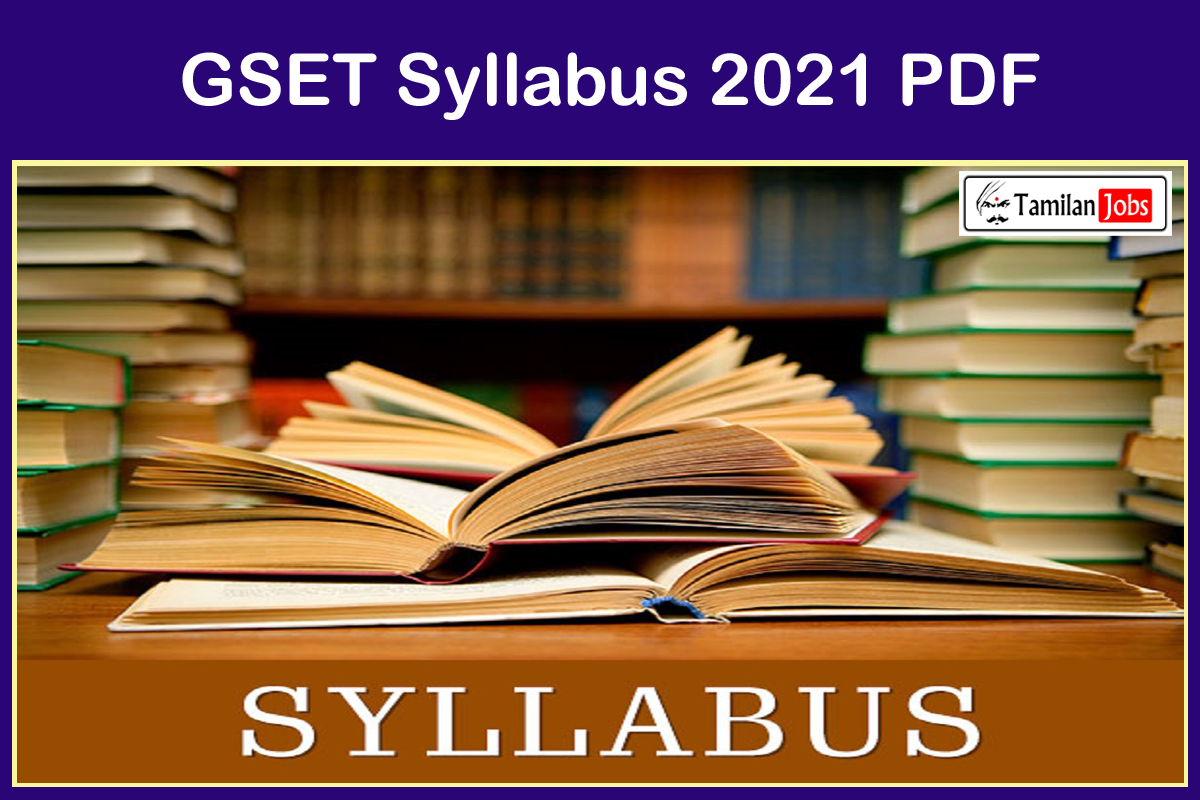GSET Syllabus 2021 PDF | Download Exam Pattern @ www.gujaratset.in: The Maharaja Sayajirao University of Baroda has released the Syllabus and Exam Pattern for the Gujarat State Eligibility Test. All such who have applied for this job test can download your syllabus from the below link. The date of examination will be informed soon at the official website – https://www.gujaratset.in/index.php.
GSET Syllabus 2021 PDF – Overview

| Download GSET 2021 Syllabus PDF | |
|---|---|
| Organization Name | The Maharaja Sayajirao University of Baroda |
| Exam Name | Gujarat State Eligibility Test |
| Category | Syllabus |
| Syllabus | Released |
| Official website | www.gujaratset.in |
GSET Exam Pattern 2021
- GSET Examination contains 2 papers. The examination will be conducted as a Multiple-Choice Question pattern in Optical Mark Reader (OMR) Sheet.
- 50 questions will be asked in Paper I and 100 questions will be asked in Paper-II. All the questions are compulsory and each one carries 2 marks.
- Paper, I contain questions from general nature, intended to assess the teaching, reasoning ability, comprehension, divergent thinking, and general awareness
- In Paper II questions will be asked based on the subject selected by the candidate.
- No negative marks will be given for wrong answers.
- Candidates must have to attend both examinations.
- The total exam timing is 3 hours from 9.30 am to 12.30 pm.
- The language is both Gujarati and English except for languages and science subjects.
| Exam Paper | Marks | Number of Questions | Duration |
| Paper I | 100 | 50 Compulsory Questions | 3 hours from 9.30 am to 12.30 pm |
| Paper-II | 200 | 100 compulsory Question |
GSET Syllabus 2021
The syllabus for GSET 2021 Examination is the same as UGC / CSIR NET Syllabus. Paper I is the same as all subjects and Paper II is based on concerning subjects. Paper, I Syllabus listed below. Candidates can download their respective subject syllabus by visiting the official website of Gujarat SET or Directly from here by using the link given below.
GSET Paper I Syllabus
GSET Paper I syllabus contains 10 units. Each unit was listed below. 50 questions will be asked from this unit and each question carries 2 marks. Medium is English and Gujarati.
Teaching Aptitude:
- Teaching: Concept, Objectives, Levels of teaching (Memory, Understanding, and Reflective), Characteristics, and basic requirements.
- Learner’s characteristics: Characteristics of adolescent and adult learners (Academic, Social, Emotional and Cognitive), Individual differences.
- Factors affecting teaching related to Teacher, Learner, Support material, Instructional facilities, Learning environment, and Institution.
- Methods of teaching in Institutions of higher learning: Teacher-centered vs. Learner-centered methods; offline vs. Online methods (Swayam, Swayamprabha, MOOCs, etc.).
- Teaching Support System: Traditional, Modern, and ICT based.
- Evaluation Systems: Elements and Types of evaluation, Evaluation in Choice Based Credit System in Higher education, Computer-based testing, Innovations in evaluation systems.
Research Aptitude:
- Research: Meaning, Types, and Characteristics, Positivism and Postpositivistic approach to research.
- Methods of Research: Experimental, Descriptive, Historical, Qualitative, and Quantitative methods.
- Steps of Research.
- Thesis and Article writing: Format and styles of referencing.
- Application of ICT in research.
- Research ethics
Comprehension:
A passage of text is given. Questions are asked from the passage to be answered.
Communication:
- Communication: Meaning, types, and characteristics of communication.
- Effective communication: Verbal and Non-verbal, Inter-Cultural and group communications, Classroom communication.
- Barriers to effective communication.
- Mass-Media and Society.
Mathematical Reasoning and Aptitude:
- Types of reasoning.
- Number series, Letter series, Codes, and Relationships.
- Mathematical Aptitude (Fraction, Time & Distance, Ratio, Proportion and Percentage, Profit and Loss, Interest and Discounting, Averages, etc.).
Logical Reasoning:
- Understanding the structure of arguments: argument forms, the structure of categorical propositions, Mood and Figure, Formal and Informal fallacies, Uses of language, Connotations and denotations of terms, Classical square of opposition.
- Evaluating and distinguishing deductive and inductive reasoning.
- Analogies.
- Venn diagram: Simple and multiple uses for establishing the validity of arguments.
- Indian Logic: Means of knowledge.
- Pramanas: Pratyaksha (Perception), Anumana (Inference), Upamana (Comparison), Shabda (Verbal testimony), Arthapatti (Implication), and Anupalabddhi (Non-apprehension).
- Structure and kinds of Anumana (inference), Vyapti (invariable relation), Hetvabhasas (fallacies of inference).
Data Interpretation:
- Sources, acquisition, and classification of Data.
- Quantitative and Qualitative Data.
- Graphical representation (Bar-chart, Histograms, Pie-chart, Table-chart, and Line-chart) and mapping of Data.
- Data Interpretation.
- Data and Governance.
Information and Communication Technology (ICT):
- ICT: General abbreviations and terminology.
- Basics of the Internet, Intranet, E-mail, Audio, and Video-conferencing.
- Digital initiatives in higher education.
- ICT and Governance.
People, Development and Environment:
- Development and environment: Millennium development and Sustainable development goals.
- Human and environment interaction: Anthropogenic activities and their impacts on the environment.
- Environmental issues: Local, Regional and Global; Air pollution, Water pollution, Soil pollution, Noise pollution, Waste (solid, liquid, biomedical, hazardous, electronic), Climate change and its Socio-Economic and Political dimensions.
- Impacts of pollutants on human health.
- Natural and energy resources: Solar, Wind, Soil, Hydro, Geothermal, Biomass, Nuclear, and Forests.
- Natural hazards and disasters: Mitigation strategies.
- Environmental Protection Act (1986), National Action Plan on Climate Change, International agreements/efforts -Montreal Protocol, Rio Summit, Convention on Biodiversity, Kyoto Protocol, Paris Agreement, International Solar Alliance
Higher Education System:
- Institutions of higher learning and education in ancient India.
- Evolution of higher learning and research in Post Independence India.
- Oriental, Conventional, and Non-conventional learning programmes in India.
- Professional, Technical, and Skill-Based education.
- Value education and environmental education.
- Policies, Governance, and Administration
NOTE:
- Five questions each carrying 2 marks are to be set from each Module.
- Whenever graphical/pictorial question(s) are set for sighted candidates, a passage followed by an equal number of questions and weightage be set for visually impaired candidates.
GSET Paper II Syllabus
In paper II questions will be asked from concerned subjects. 100 compulsory questions will be asked from this paper. Each question carried 2 marks.
| Subject Code | Subject Name | Medium of Instructions | Syllabus |
| 01 | Mathematical Sciences | English | Mathematics
Mathematical Science Statistics App. Maths Ind. Maths |
| 02 | Physical Sciences | English | Physics
Physical Science |
| 03 | Chemical Sciences | English | Chemistry
Chemical Science |
| 04 | Life Sciences | English | Life Science
Botany Zoology Microbiology Biotechnology Biochemistry Virology Bioinformatics Genetics |
| 05 | Hindi | Hindi | Hindi |
| 06 | Gujarati | Gujarati | Gujarati |
| 07 | Sanskrit | Sanskrit | Sanskrit |
| 08 | History | English & Gujarati | History |
| 09 | Sociology | English & Gujarati | Sociology |
| 10 | Economics | English & Gujarati | Economics |
| 11 | Political Science | English & Gujarati | Political Science
Politics |
| 12 | English | English | English |
| 13 | Education | English & Gujarati | Education |
| 14 | Psychology | English & Gujarati | Psychology |
| 15 | Library and Information Science | English & Gujarati | Library and Information Science |
| 16 | Law | English & Gujarati | Law |
| 17 | Commerce | English & Gujarati | Commerce |
| 18 | Management | English | Management |
| 19 | Computer Science and Application | English | Computer Science and Application |
| 20 | Earth Sciences | English | Geology
Geoinformatics |
| 21 | Physical Education | English & Gujarati | Physical Education |
| 23 | Home Science | English & Gujarati | Home Science |
| 25 | Social Work | English & Gujarati | Social Work |

